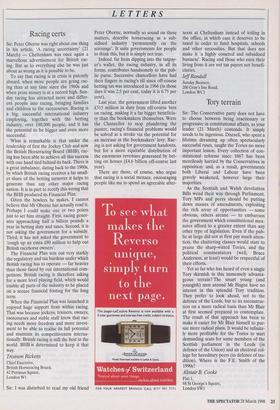LETTERS Racing certs
Sir: Peter Oborne was right about one thing in his article, 'A racing uncertainty' (21 March) — Cheltenham was once again a marvellous advertisement for British rac- ing. But as to everything else he was just about as wrong as it is possible to be. To say that racing is in crisis is patently absurd, when more people are going rac- ing than at any time since the 1960s and when prize money is at a record high. Sun- day racing has attracted more and differ- ent people into racing, bringing families and children to the racecourses. Racing is a big, successful international industry employing, together with the betting industry, over 100,000 people, and it has the potential to be bigger and even more successful.
What is remarkable is that under the leadership of first the Jockey Club and now the British Horseracing Board (BHB), rac- ing has been able to achieve all this success with one hand tied behind its back. There is a great imbalance, dating back to the 1960s, by which British racing receives a far small- er share of the betting turnover it helps to generate than any other major racing nation. It is in part to rectify this wrong that the BHB produced its Financial Plan. Given the howlers he makes, I cannot believe that Mr Oborne has actually read it. Perhaps I could make one or two points just to set him straight. First, racing gener- ates approaching half a billion pounds a year in betting duty and taxes. Second, it is not asking the government for a subsidy. Third, it has not asked the government to `cough up an extra £80 million to help out British racehorse owners'.
The Financial Plan sets out very starkly the regulatory and tax burdens under which British racing has to operate — far heavier than those faced by our international com- petitors. British racing is therefore asking for a more level playing field, which would enable all parts of the industry to be placed on a secure financial footing for the long term.
When the Financial Plan was launched it enjoyed huge support from within racing. That was because jockeys, trainers, owners, racecourses and stable staff know that rac- ing needs more freedom and more invest- ment to be able to realise its full potential and maintain its competitiveness interna- tionally. British racing is still the best in the world. BHB is determined to keep it that way.
Tristram Ricketts
Chief Executive, British Horseracing Board, 42 Portman Square, London W1






















































 Previous page
Previous page